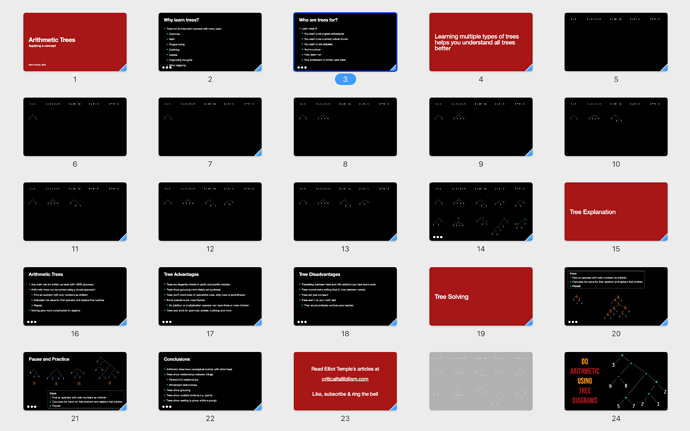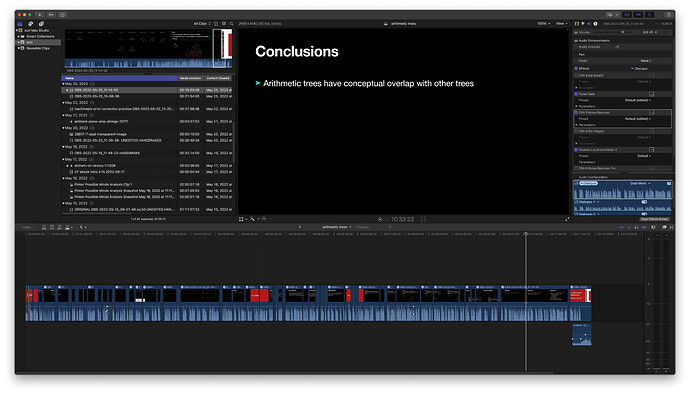I don’t think in terms of total amount of time or track it. But let’s see:
Recording was one unscripted take for 19 minutes. That looks like maybe 30 cuts to remove silences. Not much but I did have to pay attention to animations. Let’s say 15min on editing. I didn’t use Recut because of all the animation.
YouTube stuff like title, description and table of contents was quick too. The thumbnail was a first version without brainstorming options. I did try a few other text colors besides red and orange.
I don’t remember if I watched the video. Sometimes I edit, export, watch, and then make a few more edits. At 2x speed or higher, watching would have taken up to 6 minutes.
Sometimes I play back a lot of the video in Final Cut (at 2x) while editing. Other times I just look at waveforms and do edits with little playback (or use a tool like Recut). In that case, I’m more likely to watch the video through after editing to check for issues and see what it’s like.
We could put video creation into categories:
- writing slides
- slide art and animation
- script
- recording
- editing
- YouTube stuff
These categories use different amounts of creativity and mental energy. I bolded the harder ones.
Writing slides or scripts is writing. It’s like writing essays. By contrast, editing, animating and reading a script is mentally easier. To some extent, it competes for time with watching YouTube or playing video games, rather than with writing. (BTW, for me forum use is mostly easy.)
Unscripted recording is closer to writing – I have to use creativity and think about what to say. Figuring out what to say uses mental energy but only once – either to write a script or to do it while recording, but not both. In this case, I didn’t use a script.
The harder, creative stuff is rewarding in a similar way to writing essays. It’s just writing or talking about ideas. Animating is less rewarding but also easier so it’s OK.
I worked on this over two days. The first day I made some slides. Second day I decided it needed to be more focused and I cut some slides. I put them in another presentation for a potential other video covering some math topics like infix/prefix/postfix. Then I added a few more slides to complete this video. Then I recorded and edited. On the second day, afterwards, I also did another video of similar length from start to finish which I think took under 2 hours because I know it wasn’t that late in the day when I finished it. I did some of the YouTube stuff days later and batched it – I think I made 5 thumbnails in a row.
So, total time excluding the unused slides? Hard to tell but probably under 3 hours.
That only includes direct time use, not e.g. time watching animation or editing tutorial videos. And not counting the extra time that previous videos took because I was newer at animating and editing.
In general, I think days of work is a more accurate/useful metric than hours of work.
If you think 3 hours means the video cost 20% of a day, you’d be wrong. It definitely cost more than that. I can’t write for 15 hours a day. Not even close. Even the easier stuff like animating or editing would be too hard to do for that long per day.
3 hours of good focus and creativity in a day is plenty. Add 5 hours of easier stuff and that’s enough to burn most people out if they average that much, 7 days a week, for a few months. (That’s assuming they weren’t tired out at the start and they get enough sleep, or it’d be worse.)

